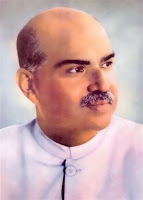SRI AUROBINDO ON ORIGINAL THINKING
On Original Thinking
The most
striking instance is our continued helplessness in the face of the new
conditions and new knowledge imposed on us by recent European contact. We have
tried to assimilate, we have tried to reject, we have tried to
select; but we have not been able to do any of these things successfully.
Successful assimilation depends on mastery; but we have not mastered European
conditions and knowledge, rather we have been seized, subjected and enslaved by
them. Successful rejection is possible only if we have intelligent
possession of that which we wish to keep. Our rejection too must be an
intelligent rejection; we must reject because we have understood, not because
we have failed to understand. But our Hinduism, our old culture are
precisely the possessions we have cherished with the least intelligence;
throughout the whole range of our life we do things without knowing why we do
them, we believe things without knowing why we believe them, we assert things
without knowing what right we have to assert them,—or, at most, it is because
some book or some Brahmin enjoins it, because Shankara thinks it, or because
someone has so interpreted something that he asserts to be a fundamental
Scripture of our religion. Nothing is our own, nothing native to our
intelligence, all is derived. As little have we understood the new knowledge;
we have only understood what the Europeans want us to think about themselves
and their modern civilisation. Our English culture—if culture it can be
called—has increased tenfold the evil of our dependence instead of remedying
it.
More even than the other two processes successful selection
requires the independent play of intellect. If we merely receive new ideas and
institutions in the light in which they are presented to us, we shall, instead
of selecting, imitate—blindly, foolishly and inappropriately. If we receive
them in the light given by our previous knowledge, which was on so many points
nil, we shall as blindly and foolishly reject. Selection demands that we should
see things not as the foreigner sees them or as the orthodox Pandit sees them,
but as they are in themselves. But we have selected at random, we have rejected
at random, we have not known how to assimilate or choose. In the upshot we
have merely suffered the European impact, overborne at points, crassly
resisting at others, and, altogether, miserable, enslaved by our environments,
able neither to perish nor to survive. We preserve indeed a certain ingenuity
and subtlety; we can imitate with an appearance of brightness; we can play
plausibly, even brilliantly with the minutiae of a subject; but we fail to
think usefully, we fail to master the life and heart of things. Yet it is only
by mastering the life and heart of things that we can hope, as a nation, to
survive.
How shall we recover our lost intellectual freedom and
elasticity? By reversing, for a time at least, the process by which we
lost it, by liberating our minds in all subjects from the thraldom to
authority. That is not what reformers and the Anglicised require of us. They
ask us, indeed, to abandon authority, to revolt against custom and
superstition, to have free and enlightened minds. But they mean by these
sounding recommendations that we should renounce the authority of Sayana for
the authority of Max Muller, the Monism of Shankara for the Monism of Haeckel,
the written Shastra for the unwritten law of European social opinion, the
dogmatism of Brahmin Pandits for the dogmatism of European scientists, thinkers
and scholars. Such a foolish exchange of servitude can receive the assent of
no self-respecting mind. Let us break our chains, venerable as they are,
but let it be in order to be free,—in the name of truth, not in the name of
Europe. It would be a poor bargain to exchange our old Indian illuminations,
however dark they may have grown to us, for a derivative European enlightenment
or replace the superstitions of popular Hinduism by the superstitions of
materialistic Science.
Our first necessity, if India is to survive and do her appointed
work in the world, is that the youth of India should learn to think,—to think
on all subjects, to think independently, fruitfully, going to the heart of
things, not stopped by their surface, free of prejudgments, shearing sophism
and prejudice asunder as with a sharp sword, smiting down obscurantism of all
kinds as with the mace of Bhima. Let our brains no longer, like
European infants, be swathed with swaddling clothes; let them recover the
free and unbound motion of the gods; let them have not only the minuteness but
the wide mastery and sovereignty natural to the intellect of Bharata and easily
recoverable by it if it once accustoms itself to feel its own power and be
convinced of its own worth. If it cannot entirely shake off past shackles, let
it at least arise like the infant Krishna bound to the wain, and move forward
dragging with it wain and all and shattering in its progress the twin trees,
the twin obstacles to self-fulfilment, blind mediaeval prejudice and arrogant
modern dogmatism. The old fixed foundations have been broken up, we are tossing
in the waters of a great upheaval and change. It is no use clinging to the old
ice-floes of the past, they will soon melt and leave their refugees struggling
in perilous waters. It is no use landing ourselves in the infirm bog, neither sea
nor good dry land, of a second-hand Europeanism. We shall only die there a
miserable and unclean death. No, we must learn to swim and use that power to
reach the good vessel of unchanging truth; we must land again on the eternal
rock of ages.
Let us not, either, select at random, make a nameless hotchpotch
and then triumphantly call it the assimilation of East and West. We must begin
by accepting nothing on trust from any source whatsoever, by questioning
everything and forming our own conclusions. We need not fear that we shall by
that process cease to be Indians or fall into the danger of abandoning Hinduism.
India can never cease to be India or Hinduism to be Hinduism, if we really
think for ourselves. It is only if we allow Europe to think for us that
India is in danger of becoming an ill-executed and foolish copy of Europe. We
must not begin by becoming partisans but know before we take our line. Our
first business as original thinkers will be to accept nothing, to question
everything. That means to get rid of all unexamined opinions old or new, all
mere habitual sanskaras in the mind, to have no preconceived judgments.




Comments
Post a Comment